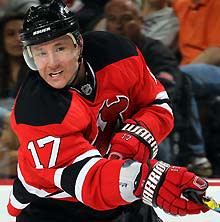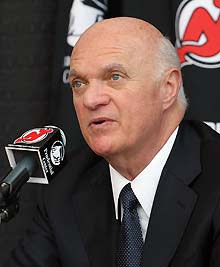Kovalchuk decision raises troubling questions
It was common sense. Who could see Ilya Kovalchuk(notes), 44 years old, hair graying, stride slowing, playing to the end of his 17-year, $102-million contract with the New Jersey Devils?
There was no doubt Kovalchuk and the Devils violated the spirit of the salary cap. There was no doubt the only reason the deal was that long and that front-loaded – stretching to 2026-27, with a $550,000 salary the last five seasons – was to make the cap hit as palatable as possible. There was no doubt Kovalchuk and the Devils went much further than other parties to have previously used this tactic.
But now that arbitrator Richard Bloch has sided with the NHL, voiding the deal because it circumvented the collective bargaining agreement, there are all kinds of questions. The biggest one is this: Where, exactly, is the line?
If Kovalchuk and the Devils crossed it, why didn't Marian Hossa(notes) and the Blackhawks, Henrik Zetterberg(notes) and the Red Wings, Roberto Luongo(notes) and the Canucks or others? Why can you play until 43, but not 44? Why is a 12-year deal acceptable, but not 17? Why can the salary drop to $750,000 at the end of the deal, but not to $550,000?
Kovalchuk, an unrestricted free agent, can try again with the Devils or the Kings or whomever he wants. Devils general manager Lou Lamoriello said in a statement that negotiations have resumed. But maybe Kovalchuk should take that 17-year offer from the KHL.
Bloch's decision is a major victory for the NHL. It means the league apparently has the power to judge subjectively what circumvents the cap and what doesn't. Whenever a team considers signing a player to a long-term deal now, its executives can envision the Devils making a splash with Kovalchuk at an introductory news conference, only to be slapped for breaking the rules.
What, exactly, are the rules? They aren't clear. At least they aren't clear enough. Whoever lost this battle was going to have to push for more precise language in the next collective bargaining agreement, and now the onus is on the NHL Players' Association.
The current CBA, which expires after the 2011-12 season, states that no one can take an action that "is intended to or has the effect of defeating or circumventing" the agreement. But it also states that it is "not deterring or prohibiting conduct permitted by this agreement, the latter conduct not being a circumvention."
The legal argument for Kovalchuk and the Devils was essentially this: The CBA is not specific enough. It does not spell out what you can't do. There are no limits to the length of contracts. There is nothing prohibiting this kind of structure.
"Salary cap systems are essentially a set of detailed rules," said Jeffrey Kessler, outside counsel for the NFL and NBA players' unions, who has represented the NHLPA in the past. "Think of it like the tax code. There's nothing wrong if the rules allow for people to do it to structure things to take advantage of the tax code to reduce your taxes. There's nothing wrong with taking advantage of the salary cap rules to create more room to sign players. …
"Intent should not matter. What should matter is whether you follow the rules or not."
The business of sports is competitive. Teams try to put together the best rosters they can. Agents try to squeeze the most value for their players. Leagues try to rein in everyone. When salary caps enter into the equation, it's natural for there to be growing pains as teams and agents figure out how to maneuver within the rules.
Remember that the NHL salary cap is still in its infancy. It was born in 2005. The NFL, which introduced its cap in 1994, has had test cases. Quarterback Elvis Grbac, for example, was the guinea pig for how base salary could be converted into signing bonus for cap purposes. The "Deion Sanders Rule" came about after a fight about how money moved from a capped year into an uncapped year.
But perhaps growing pains is the wrong way to put it. CBAs and salary caps are constantly evolving. The NFL established a rookie pool that was intended to be a salary cap within a salary cap, and over the years, teams and agents found so many loopholes that it has become almost meaningless. Now the league has no cap at all and one of the big issues is … rookie salaries.
These issues end up back at the bargaining table. The NBA has negotiated rules governing new contracts for players older than 34, how much salaries can grow each year and the lengths of contracts and more.
"There may be things that evolved that the owners don't like and things that the players don't like, and that stuff gets traded off some way," Kessler said. "In bargaining, you change it in exchange for something else."
For the good of everyone – teams, agents, players and fans – the cap rules must be clarified in the next CBA. In the meantime, we're all left guessing – no one more than the Devils. Zach Parise's(notes) contract is up after this season. Ought to be an interesting negotiation.


